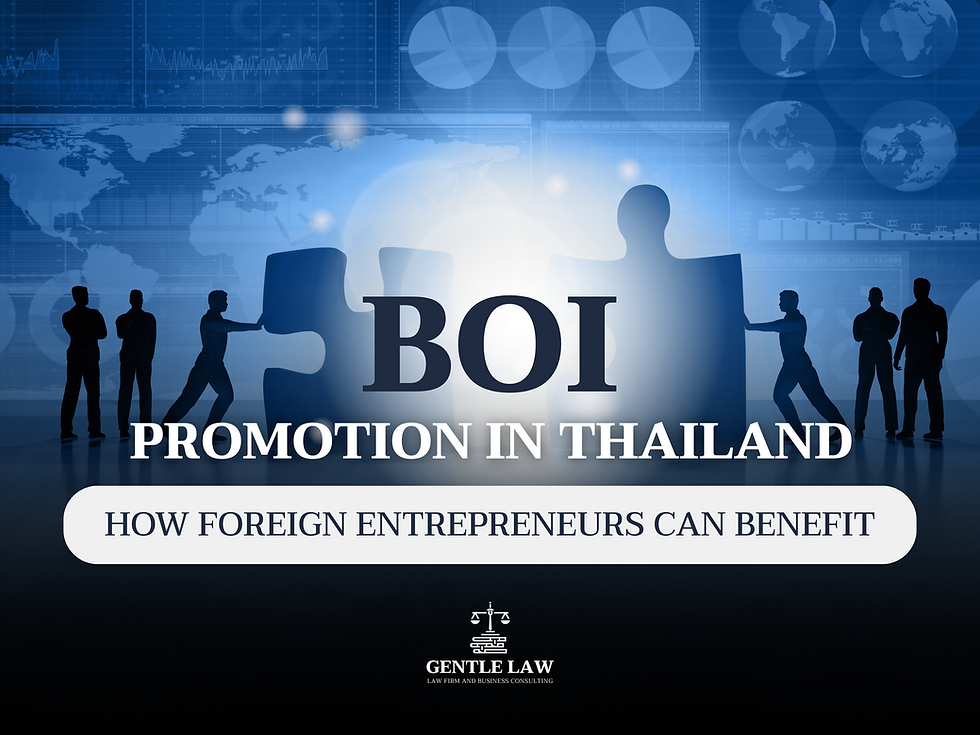Thailand BOI vs Foreign Business License (FBL): Choosing the Right Path
- gentlelawlawfirm
- Jun 23, 2025
- 2 min read
Updated: Jun 30, 2025

Thailand BOI vs FBL? As foreign entrepreneurs entering Thailand, your choice between BOI promotion and a Foreign Business License (FBL) shapes ownership, permits, taxation, and compliance. GENTLE LAW IBL compares both routes in detail, grounded in Thai law and practical business needs.
What Are BOI and FBL?
Term | Definition |
BOI | Thailand Board of Investment—promotes eligible sectors under the Investment Promotion Act, offering incentives and foreign ownership privileges. |
FBL | A license issued via the Foreign Business Act B.E. 2542 to operate in restricted activities (List 2 or 3). Governed by the Department of Business Development under the Ministry of Commerce. |
⚖️ Direct Comparison: Thailand BOI vs FBL
Criteria | BOI | FBL |
Legal Basis | Investment Promotion Act B.E. 2520 | Foreign Business Act B.E. 2542 |
Ownership | Up to 100% | Up to 100% (if approved) |
Applicable Sectors | Promoted industries only | Restricted sectors (List 2 & 3 FBA) |
Incentives | Tax holiday, import duty waiver, OSOS visa/work permit fast-track | None |
Application Authority | BOI (Prime Minister’s Office) | Department of Business Development |
Approval Rate | High for aligned sectors | Low and discretionary |
Processing Time | 30–90 days | 90–180+ days |
Visa/Work Permit | Exempt ratio, fast via OSOS | Standard ratio (4 Thai : 1 foreigner) |
Land Ownership | Possible under BOI conditions | Not available |
✅ When to Choose BOI
You operate in BOI-promoted sectors: tech, manufacturing, biotech, digital, etc.
You desire 100% ownership with no Thai partner.
You plan to employ multiple foreign staff.
You want tax breaks, import duty exemption, and visa facilitation.
🟢 BOI also allows land ownership under promotion terms and OSOS visa/work-permit speed-up.
✅ When FBL Is the Path
Your business is restricted but not BOI-eligible (e.g., certain service or trading businesses).
You have a strong local impact argument—job creation, technology transfer.
You accept the 49% foreign limit unless FBL allows full majority under strict conditions.
Prepare for a longer, discretionary application with supportive documentation.
Case Example
A UK consulting firm:
BOI: ❌ Not eligible (consulting is not BOI-promoted).
FBL: ✅ Granted with robust business plan, Thai office, and hiring strategy—approval in ~5 months. GENTLE LAW IBL supported the entire application process.
📌 Key Legal Insights
BOI requires strict alignment with promoted sectors and ongoing compliance (e.g., investment quotas).
FBL must satisfy economic and social benefit criteria; outcome is at the discretion of officials.
Illegal nominee shareholding is prohibited across both options; penalties under FBA include fines and imprisonment.
🛡️ How GENTLE LAW IBL Supports You
Assess your eligibility for BOI or FBL.
Draft and submit your application: plans, financials, projections.
Handle agency interactions and negotiations.
Post-approval support: entity registration, visa and permit coordination, ongoing compliance.
🔚 Final Takeaway
For promoted sectors, BOI is often the superior choice—clearer process, stronger benefits, and operational flexibility. For other restricted businesses, FBL remains viable but demands detailed preparation and legal finesse.
GENTLE LAW IBL is your strategic partner—ensuring you choose and complete the right path for legal robustness and business growth in Thailand.
📞 Book a free BOI vs FBL strategy session today.



